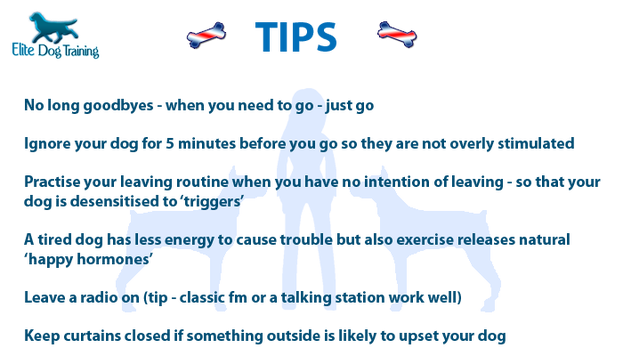|
Being left alone is a reality all dogs must face at some point in their life and the amount of distress it causes each dog can vary dramatically. Some dogs are anxious the entire time the owner is away - others settle after a while. Many dogs show signs of being anxious, but these are generally missed by their owners unless they are destructive or noisy. Some owners may be 'prisoners' in their own home afraid to leave fearing the dog is too stressed in their absence.
Dogs can overcome separation anxiety although for some dogs this may take a long time. Prevention is better than cure (get your dog used to short times alone from day 1). New puppies are notoriously prone to separation anxiety as they're experiencing allot of new changes, but dogs of any age can become anxious when alone. Some people with new puppies are lucky enough to have planned some time off work / holiday time to spend with their new puppy - which is ideal. However it's normally the last day or two before work or social life calls them away that they start to get the puppy used to time alone - which is when many people panic that their puppy is screaming the house down the day before they have a full day of work the following day and they call me asking for an emergency training session and 'do I know someone who does full day care services? Get your dog used to being away from you (using a barrier if required) and start at the easiest stage - being in the same room but distance yourself from the dog (maybe only an inch or two if necessary)
Start by having a small barrier between you and your dog and then gradually build up the length of time you’re away from your dog (but in sight) before increasing the distance. For some dogs - just being unable to touch you freely is enough to cause anxiety. Ensure there is something nice to distract your dog while separated from you - like a KONG toy, safe chew or their dinner. While separated from your dog - do not interact with them - if you find your dog is particularly upset at being ignored - try talking to someone else in the room, reading a newspaper or talking to yourself as many dogs will entertain themselves when you seem 'busy'. Do not go back to a barking dog if you can avoid doing so- you can only build up distance between you when the dog is comfortable at close range for a length of time. If your dog is overly stressed for a length of time - you need to go back a step and reduce your distance to a level the dog is comfortable with. Once you have mastered the time at a short distance - adding distance will get easier. If adding distance causes your dog distress - you haven't mastered the time at a shorter distance. Being out of your dog’s sight must be gradual and every 'trigger' (an event that your dog associates with you leaving such as picking up your keys or opening a door) you must spend time desensitising your dog to. |
For more advice please contact Elite Dog Training to book a session
How do I know if my dog has separation anxiety?
A dog with separation anxiety may show some, all or a variation of the following signs in the run up or during time alone: Panting Salivating Vomiting Pacing or trying to escape Vocal distress (whimpering, howling, barking) Depression Loss of appetite Loss of bowel / bladder control Destructive behaviour ( e.g. chewing, destroying house, self harm) How much training will my dog need if he has separation anxiety? Every dog is different - and every owners patience, training experience and commitment is different. With my guidance I can speed up the process for you both and with the session you will get a help sheet to guide you once I am gone. Some dogs have benefitted from one session with me and ongoing training from their owners while other dogs may require a many sessions with myself and their owners. I am yet to meet a dog that has not benefitted from my separation anxiety classes but it's down to the owner to keep up with the training once I am gone. Should I get another dog to keep my dog company? If you are getting a second dog purely to 'cure' your dogs separation anxiety then no. Another dog does not guarantee that your first dog will not be anxious when you leave and instead of one upset dog you may well end up with two upset dogs - even if the other seems content at first. When I've had a dog with separation anxiety boarding in my own house (with my own 5 dogs as 'companions') and I leave the room for the first time - the anxious 'Mr Yappy' dog doesn't care how many other dogs are in the same room as them - all that matters is that I've left the room and they're overwhelmed that I've left them. On my return, Mr Yappy dog is very happy to see me and my own, normally relaxed dogs, are equally happy I've returned to 'shut up' Mr Yappy so they can sleep. Should I tell me dog off when I return if he's been naughty? As annoying, unpleasant and frustrating as your dogs anxious behaviour has been - you must not reward this behaviour with a response. If you yell / punish your dog it is a form of attention and to a dog with separation anxiety - attention that is negative is still attention worth having! Additionally you are adding even more emotion to your dogs already insecure state. You must resist rewarding your dog on your return. Your return in itself is a reward for the dog and if the dog has been good (or bad) you should avoid making any contact (visually or verbally) with a dog with separation anxiety on your return. Your dog needs to learn that you coming and going is no big deal - not await big hugs and kisses on your return. It is hard for most owners to do at first. Give your dog time to settle once you return before giving them attention. I will ignore my dogs for about 5 minutes on my return and once they have settled I can give them all the fuss in the world! |
| Currently unavailable |
|










